After our 4 hour trip, we came winding down the dusty serpentine road and pulled up at the top of the stairs leading down to the site of the last remaining footbridge of the Incan empire. I hopped out, grabbed the camera and headed down to the site, where the men of the surrounding villages were hard at work on day 2 of the rebuilding.
Now, I will confess something. I knew that women are not allowed at the bridge-building site. Victoriano had mentioned it when I was there last October. But I have this little problem. When I am told that I’m not allowed to do something, I, um, have a hard time listening.
As what you might call a “global citizen,” I have always had the utmost respect for cultural traditions that I don’t understand. I know that segregation is a very deep-rooted part of many cultures, and I can understand that the difference between the sexes is an obvious and sacred part of many societies. In no way do I wish to cross the lines of ancient Andean traditions that uphold differences and hold certain ceremonies sacred.
That said, I am also a feminist. And the whole “no vaginas allowed” thing is a real kick in my modern/western gut.
So, I went down the mountain. I hefted my camera and eased my way down, closer and closer to the builders. The mob of masculinity below was pretty focused on the task of stretching the grass cables across the river gorge. I managed to get pretty close before frantic exclamations from the other side brought it to their attention.
As I said, I have the utmost respect for cultural traditions and as soon as I was asked to leave I did, clambering my way across the rock face to an outcropping that provided me with a decent enough view.
Matthew took over the role of cinematographer, and took some lovely shots of Victoriano weaving the bridge floor while suspended over the river. In the meantime, at the top of the stairway, our toddler played on the dirt road lined with women and children, while I craned my neck over the cliff to watch the progress.
Quite honestly, I much prefer the company of the other mothers and grandmothers, their busy hands pounding, rolling and weaving the ichu grass into stands of braided rope. Their delight with Rosali and her blue eyes, their gorgeously colored clothing, the smiles we shared over our children’s play. But still. We were the excluded ones.
This beautiful, rich ancient culture is in danger. Victoriano’s sons are not interested in straddling two thick, handwoven cables as they swing over a gorge, weaving strands of grass into bridge railings. They should have been there, next to him, in that male-only gathering. But not until the last day of the festival, the bridge already complete, did they show up, in their skinny jeans and button up shirts, cell phones and messenger bags. And his daughter, who I watched sing into a microphone at the village festival, swishing her vibrantly colored skirt, belting out Quechua lyrics, cannot even approach her father as he works. But when I asked her, would she take over his role if it was permitted, she didn’t hesitate. “Yes.”
I think, in our world today, tradition may find that to preserve itself, it must transform its very nature. I wonder what the people of Huinchiri are ready for.

